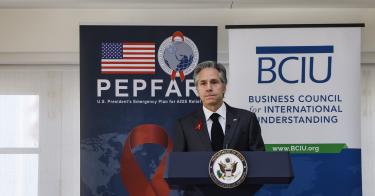It’s been 25 years since George W. Bush established the President’s Emergency Plan for AIDS Relief (PEPFAR) as a five-year emergency response to an epidemic ravaging Africa and other parts of the world. This confirms the old adage that nothing is more permanent than a temporary government program.
PEPFAR is the most expensive foreign assistance program in history. Its average annual funding for bilateral programs exceeds $5 billion, and its total funding through 2022 (including multilateral funding) tops $110 billion. PEPFAR alone makes up the majority of U.S. global health funding.
PEPFAR is credited with saving many lives, primarily though the provision of antiretroviral treatment to AIDS sufferers in Africa. But the program was designed based on the conditions and assumptions of 2003, and it continues today largely unchanged.
PEPFAR is now up for a five-year, $30 billion renewal in Congress, but significant concerns with its structure and approach suggest that it’s time to rethink America’s largest aid program.
>>> Biden USAID’s Radical Gender Policy Is Exporting Cultural Colonialism
PEPFAR is run by the State Department rather than the U.S. Agency for International Development (USAID), and was designed as an emergency assistance rather than development program. Although the “emergency” is long over, State still runs PEPFAR as an emergency relief program, working primarily through expensive American contractors and international NGOs to distribute massive quantities of drugs purchased directly from manufacturers.
This approach works well financially for those in the PEPFAR industry. But it’s done nothing to empower Africans or end their dependency on foreign aid, and it may actually be decreasing the overall health in affected communities. According to a paper published in the International Journal of Health Policy and Management, PEPFAR is distorting local health systems in Uganda (and presumably elsewhere), and creating a brain drain away from primary and general care by paying high salaries to hire available local health care professionals to work on a single disease.
With 60 percent of all U.S. global health assistance going to PEPFAR, fewer resources are available for other health investments in developing countries that might have even greater impact on local health. For example, diarrheal diseases actually kill more people in Africa than HIV/AIDS. Many of these lives could be saved through simple and cost-effective programs that increase access to clean water.
PEPFAR has also become increasingly politicized, with the Biden administration and PEPFAR partners seeking to add their domestic social priorities (such as abortion on demand and the promotion of radical gender ideology) to a program intended to provide lifesaving assistance for the poorest and most marginalized. Using the massive financial power of PEPFAR in poor countries to force an alien social agenda on unwilling and marginalized communities amounts to cultural imperialism and neocolonialism. It also severely damages the soft-power relationships needed to combat a rising China, which is expanding in Africa and doesn’t require its partners to violate their core beliefs to receive aid.
An analysis of political contribution data from the Federal Elections Committee explains why supposedly nonpartisan development agencies and government-funded development contractors and NGOs all seem to promote this leftist agenda, even at the expense of the overall health of the most marginalized. Almost all employee contributions from PEPFAR implementers went to Democratic Party candidates and causes. State Department employees gave 93 percent of their contributions to Democrats, USAID employees gave them 96 percent, and the largest PEPFAR contractor, Chemonics, gave 97 percent to Democrats, while the large non-profits involved gave 99.8 percent.
This massive disparity suggests systemic and institutionalized political discrimination.
>>> A U.S. Embassy Should Fly Only One Flag
Congress has a moral obligation to the taxpayers to refocus and reform PEPFAR so that it is less a subsidy program for giant contractors and NGOs (and less a patronage program for clients of the Democratic Party) and more focused on the truly needy.
Before providing further funding to PEPFAR, Congress should require reform that transitions this 20-year emergency program into a development program focused on creating local capacity to prevent and treat HIV/AIDS. Congress should require that the U.S. Global AIDS Coordinator (who is responsible for managing PEPFAR) provide an explanation for the political discrimination in hiring by these agencies and organizations and a plan to redress the imbalance.
Congress should also resist the Biden administration’s effort to poison bipartisan support for PEPFAR by misusing it to promote abortion and radical gender ideology under the guise of sexual and reproductive health.
Finally, to recognize the transition from a targeted short-term emergency initiative to a long-term health sector development program, and to honor its founder, Congress should rename PEPFAR the George W. Bush Global Health Initiative.
This piece originally appeared in The Hill on 05/24/2023



